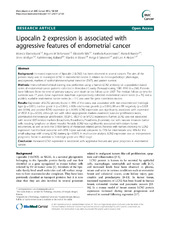| dc.description.abstract | Background: Increased expression of lipocalin 2 (LCN2) has been observed in several cancers. The aim of the present study was to investigate LCN2 in endometrial cancer in relation to clinico-pathologic phenotype, angiogenesis, markers of epithelial-mesenchymal transition (EMT), and patient survival. Methods: Immunohistochemical staining was performed using a human LCN2 antibody on a population-based series of endometrial cancer patients collected in Hordaland County (Norway) during 1981-1990 (n = 256). Patients were followed from the time of primary surgery until death or last follow-up in 2007. The median follow-up time for survivors was 17 years. Gene expression data from a prospectively collected endometrial cancer series (n = 76) and a publicly available endometrial cancer series (n = 111) was used for gene correlation studies. Results: Expression of LCN2 protein, found in 49% of the cases, was associated with non-endometrioid histologic type (p = 0.001), nuclear grade 3 (p = 0.001), >50% solid tumor growth (p = 0.001), ER and PR negativity (p = 0.028 and 0.006), and positive EZH2 expression (p < 0.001). LCN2 expression was significantly associated with expression of VEGF-A (p = 0.021), although not with other angiogenesis markers examined (vascular proliferation index, glomeruloid microvascular proliferation, VEGF-C, VEGF-D or bFGF2 expression). Further, LCN2 was not associated with several EMT-related markers (E-cadherin, N-cadherin, P-cadherin, β-catenin), nor with vascular invasion (tumor cells invading lymphatic or blood vessels). Notably, LCN2 was significantly associated with distant tumor recurrences, as well as with the S100A family of metastasis related genes. Patients with tumors showing no LCN2 expression had the best outcome with 81% 5-year survival, compared to 73% for intermediate and 38% for the small subgroup with strong LCN2 staining (p = 0.007). In multivariate analysis, LCN2 expression was an independent prognostic factor in addition to histologic grade and FIGO stage. Conclusion: Increased LCN2 expression is associated with aggressive features and poor prognosis in endometrial cancer. | en_US |

